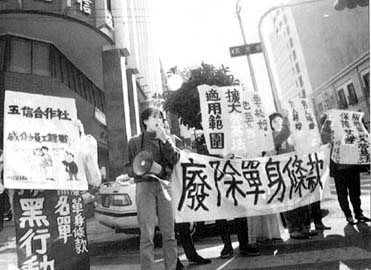 Taiwan Communiqué
No. 65, April 1995
Taiwan Communiqué
No. 65, April 1995 Taiwan Communiqué
No. 65, April 1995
Taiwan Communiqué
No. 65, April 1995In spite of Taiwan's economic prosperity and the democratic reforms achieved in recent decades, women are still struggling for equal rights in Taiwan's male-dominated society. As the leading women's rights group, Awakening Foundation, recently pointed out, many laws actually still discriminate against women. Under the Family Code law, a woman has no right to claim any property from her husband and she loses the right for custody of her children in the event of a divorce. Other laws forbid woman to file for a divorce without her husband's consent unless she can prove his infidelity, or show evidence that she has been physically abused or provide evidence that he has been charged and sentenced to a prison term of three years or longer.

Women in Taiwan are also discriminated in many work places. In certain occupations, they have to forgo marriage and motherhood, if they wants to keep their job. The practice of dismissing female workers after they get married or become pregnant is most common in the banking industry such as credit unions, stock exchange, farmers union, and in the service industry such as sales jobs in department stores, clothing stores, beauty salons, and private companies. Some companies ask that only single females under the age of 25 can apply for jobs.
Women's organization complain that changing the entrenched practice of hiring single females in work place has been hindered by the reluctance of the Kuomintang authorities to enforce the law of equal employment. Lawyers representing the Awakening Foundation have now proposed the elimination and modification of roughly 100 articles of the legislation. On 8 March 1995, Women's Day, a draft of an amendment of Taiwan's Civil Code of the family, endorsed by 30 women's organizations, was presented to the Legislative Yuan.
During the week leading up to the March 8th event, some 30,000 women in Taiwan conducted a walkout from their workplaces, schools and kitchens. On 2 March 1995, women toll collectors demonstrated at the freeway toll station in Taishan outside Taipei against the Freeway Bureau's ban on employing married women. On Wednesday, 8 March 1995, the campaign culminated in a demonstration in front of Taiwan's parliament, the Legislative Yuan. More than 30 women's organizations were represented, and a 50-meter long banner bearing more than 30,000 signatures was presented to Legislative Yuan members.
In a recently published memoirs, a former deputy chief of the Investigation Bureau of the Ministry of Justice (IBMJ) disclosed that the 1979 sedition charges against former county magistrate of Kaohsiung, Mr. Yu Teng-fa, was fabricated by agents of the Investigation Bureau. Mr. Yu Teng-fa, the patriarch of the Yu family, was a prominent leader in the then nascent "dangwai" opposition movement in the late 1970s. He was elected for two terms as the magistrate of Kaohsiung county. In early 1979, he was imprisoned on false "sedition" charges and tried in a show trial which raised eyebrows in the international press: see Far Eastern Economic Review ("A Magistrate goes on trial", March 23 1979, and "The Man Who Didn't Inform", May 4, 1979).
Mr. Yu was sentenced to eight years imprisonment, but was later released on medical bail. He was found dead in his house in Kaohsiung in 1991 under suspicious circumstances. The authorities claimed his death was a result of an accident. Mr. Kao Ming-hui, who was the Bureau's station chief in Kaohsiung City in 1979, wrote in his memoirs that the arrest of Mr. Yu was part of a scheme drawn up by the Political Warfare Department of the Ministry of Defense to imprison prominent opposition leaders on false charges.
Mr. Yu was charged for "harboring a communist agent and making propaganda for the communists." Mr. Kao wrote in his memoirs that the so-called Communist agent was in fact a mentally unstable person, who could not even recognize the flag of the People's Republic of China. Mr. Yu's family has now asked the authorities to reopen the 1979 case and reexamine the evidence and bring punitive action against the officials involved in the case. They also demand an apology and compensation.
Back to: Table of Contents
Copyright © 1995 Taiwan Communiqué